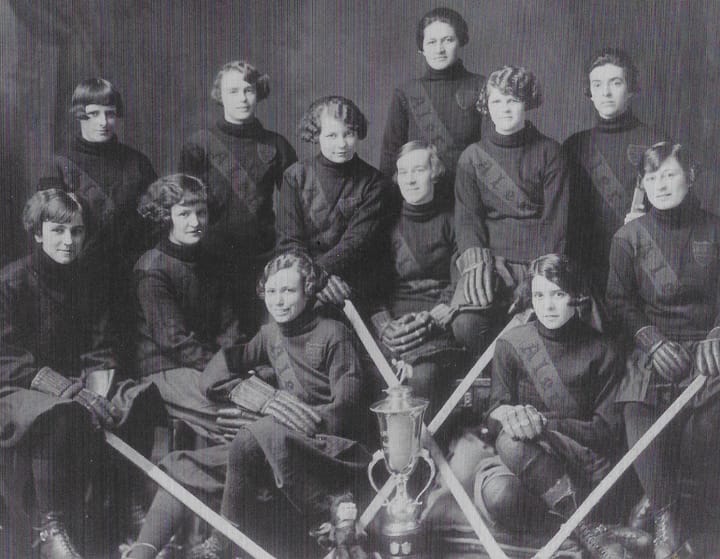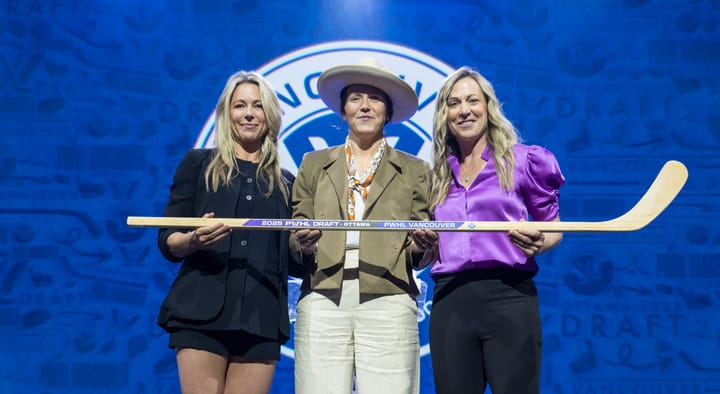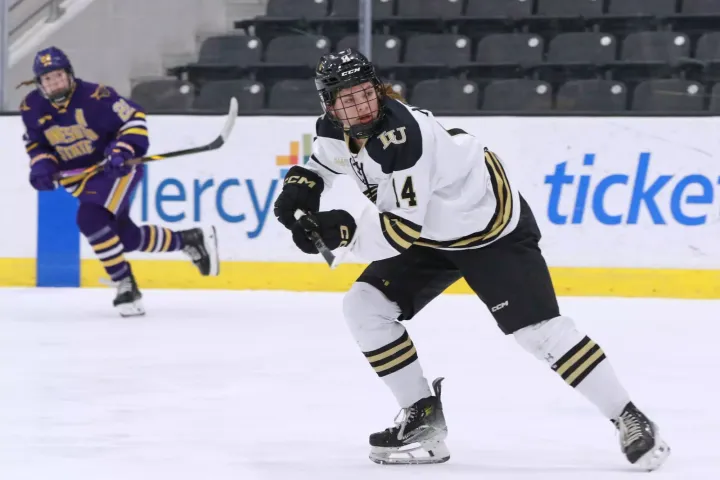Learning to play, growing the sport
Ouellette Poulin Hockey’s adult camp fills an important niche
This past weekend, I spent two days in Montreal learning hockey from some of the best women’s hockey players in the world at the Ouellette Poulin Hockey camp
I played in my first ever hockey game only three days before. So, when I showed up at Arena Ronald Caron on Saturday morning, I really didn’t have much experience skating, much less playing. I was nervous about my lack of experience and intimidated by the idea of spending two days surrounded by men and women who undoubtedly had more under their belts. As it turned out, I had no reason to worry.
When my friends sent me information about the camp, I was surprised that there was an adult camp at all. So much of women’s hockey is directed at kids that it had never occurred to me there might be an opportunity for me to learn, too. Of course, young girls are absolutely necessary for the growth of women’s hockey, and their attendance at local games and at camps ensures that there will be another wave of players to grow the sport. That doesn’t mean that adults should be left out, or that we don’t help grow the sport. The impact of a camp like this can be massive for women’s hockey, and the coaches were very aware of it.
@couellette13 and @pou29 want to thank the players that took part in the Montreal camp for adults this past weekend.
— Ouellette Poulin Hockey (@HockeyCamps1329) July 30, 2018
Thank you for your passion, work ethic and coachability. pic.twitter.com/u4K3lpHIfQ
You could see that the coaches genuinely enjoyed working with us. They were having just as much fun as we were, if not more. When asked about what makes coaching adults special, Marie-Philip Poulin said that our will to learn was her favorite part.
“I think you think that past an age you’re done learning,” she said, “but seeing all these women and guys this weekend wanting to learn, wanting to get better, getting out of that comfort zone, is something that is very special to see and makes me want to learn even more.”
Patty Giggie, attending for her second year, said that it was obvious the coaches were excited to be there.
“In my former career as an athletic trainer, I worked a few different sports camps where the ‘campers’ paid a lot of money because the camp was ‘run’ by a big name college coach,” she said. “What I witnessed was that coach wasn’t really coaching the kids...they weren’t always present and giving constant coaching. I am so impressed by these coaches. They are so invested in helping us learn.”
The camp was split into two groups, one intermediate and one more beginner group. There were close to 50 campers in all, with each group almost full. We had two 1.5 hour sessions on the ice and one off-ice training session per day.
It’s never too late to start hockey or improve your skills. Thank you to all of you who came with an open mind and great work ethic! Our coaching staff enjoyed working with you! @ctjumpstart pic.twitter.com/oN4uBjHMXT
— Ouellette Poulin Hockey (@HockeyCamps1329) July 30, 2018
Within the beginner group I was one of a few at my level. When we did skating drills that were difficult (or impossible) for me the coaches — including Les Canadiennes players Kim Deschênes and Ann-Sophie Bettez — were both patient and helpful. There was plenty of one-on-one time, whether we were shooting, stickhandling, or skating. We learned specific skills and then put them to work at stations or in 2v2, 2v3, or 3v3 situations. Off-ice, Caroline Ouellette and Julie Chu taught us how to prepare for ice time with stretches, mobility work, and plyometrics.
At the end of our last off-ice session, Caroline Ouellette implored us to support women’s sports — not just hockey — by going to games, following the players on social media, and watching online if we couldn’t go in person. She also told us to support women’s hockey by continuing to play.
Before this weekend, that wasn’t a connection I would have made on my own. After hearing her speak about why she made the decision to start offering an adult camp six years ago, the connection is much clearer.
“I met a lot of women who wanted to play the game but never had been given the opportunity,” Ouellette said, “it’s so rewarding for us, because we meet people who have always wanted to play hockey, they want to learn, they want to be taught, they’ve never been taught.”
When we say we want to grow women’s hockey, we should not just mean we want to grow the professional leagues, or the college and high school programs that may lead to it. Women’s hockey as a sport is much bigger than that, just as men’s hockey is much bigger than the NHL. Professional teams and players in hotbed cities like Boston and Toronto would likely find that there is a sizable market for adult clinics and camps, especially following the Olympics. The sport as a whole will grow as more adult women are given the chance to immerse themselves in it, and opportunities like Ouellette Poulin Hockey’s adult camp are just as valuable to the sport as ticket sales.
The Ouellette Poulin Hockey Adult Camp @HockeyCamps1329 welcomed over 60 participants from Quebec, Ontario, British Colombia, Massachusetts, New York and New Jersey.
— Ouellette Poulin Hockey (@HockeyCamps1329) July 30, 2018
Thank you for travelling from everywhere to take part in our camp this weekend @AirCanada #FlyTheFlag pic.twitter.com/dxN2Eyvu09





Comments ()